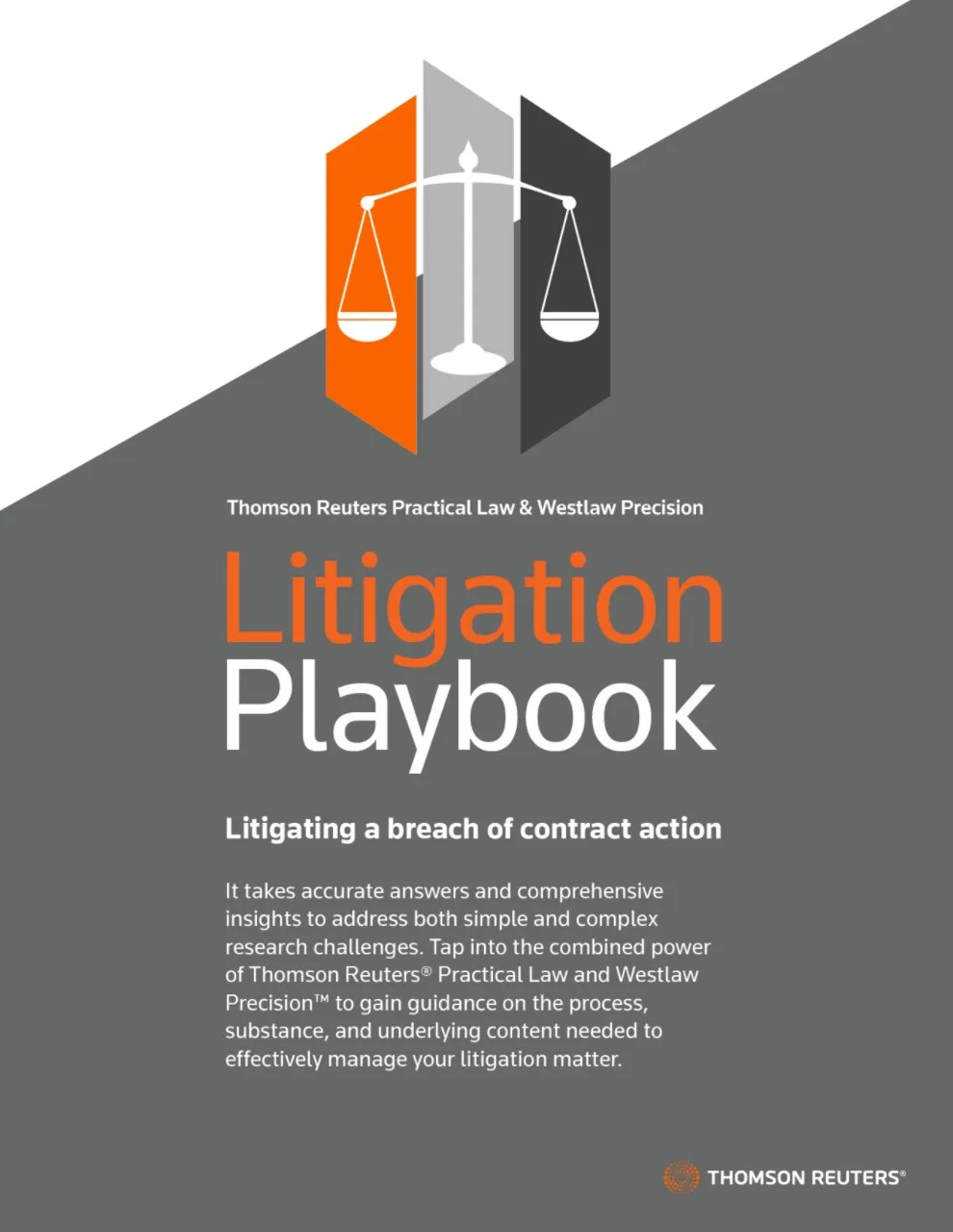"Commercially reasonable" defined with a case study from a civil contract dispute
Legal terms • contract • commercially reasonable
The following content — originally authored by Lincoln Chen, one of the attorneys representing Skyview Finance Co., LLC — was reproduced and published with permission from Chamberlain Hrdlicka with modifications by Thomson Reuters.
Jump to ↓
Definition of “commercially reasonable”
How commercially reasonable efforts can be applied in contracts

AI news and insights
Industry-leading insights, updates, and all things AI in the legal profession
Join community ↗“Commercially reasonable” defined
Black’s Law Dictionary defines commercially reasonable as efforts “conducted in good faith and in accordance with commonly accepted commercial practice. Under the UCC, a sale of collateral by a secured party must be done in a commercially reasonable manner, or the obligor’s liability for any deficiency may be reduced or eliminated. ”
In a Massachusetts federal court trial, Skyview Finance Co., LLC (“Skyview”), prevailed in a contractual dispute against Kearsarge Trading, LLC (“Kearsarge”) that dealt with “commercially reasonable efforts.”
How “commercially reasonable efforts” was applied in a civil dispute
What does “commercially reasonable efforts” entail?
That was the critical question proffered to the Honorable Patti Saris, Chief Judge of the U.S. District Court of Massachusetts. In Skyview Finance Co., LLC v. Kearsarge Trading, LLC, a civil dispute considered by the Court in the fall of 2022, this seemingly innocuous but pervasive contract term led to a judgment awarding all damages sought by Skyview and a full recovery of its legal fees and costs against Kearsarge.
Adequate Assurance clause
Whether you are a lender evaluating an investment opportunity or a contractor budgeting for a project, you may be subject to market whims. You may not be responsible for how the market moves, but you are responsible for how you react when the market turns against you.
In the Skyview matter, Skyview and Kearsarge were traders and consolidators of environmental commodities known as Solar Renewable Energy Credits (SRECs). Skyview and Kearsarge entered into four long-term contracts for Skyview to purchase and Kearsarge to deliver SRECs at a future date. By entering into long-term “futures contracts,” Skyview would profit if SREC prices rose, and Kearsarge would benefit if SREC prices fell. The price of SRECs in fact rose, and when the market moved in Skyview’s favor, Kearsarge sought a way to terminate the contracts. Specifically, Kearsarge, in reliance upon the contracts’ “Adequate Assurance” clause, demanded that Skyview post cash collateral for anticipated trades. The relevant portion of the Adequate Assurance clause stated as follows:
“Should either Party have reasonable grounds to believe that the (sic.) either the creditworthiness of the other Party has become unsatisfactory or the ability of the other Party to perform its obligations under this Agreement has become impaired then the dissatisfied Party (the “Requesting Party”) may demand that the other Party… provide assurance of its ability to perform its obligations in an amount determined by the Requesting Party in its commercially reasonable discretion… Such assurance includes… posting cash collateral with the Requesting Party…”
Skyview Fin. Co., LLC v. Kearsarge Trading, LLC, 651 F. Supp. 3d 353, 356-357 (emphasis added).
The Adequate Assurance clause can be invoked at the Requesting Party’s commercially reasonable discretion. Why then did the Court find that Kearsarge breached the Adequate Assurance provision by demanding Skyview post cash collateral?
The commercial reasonableness requirement
Under the contracts, each party was required to produce audited financial statements upon the request of the other party. Under the belief that Skyview, a private company, would not have audited financial statements, Kearsarge sought to demand Adequate Assurance when Skyview did not produce audited financials upon request.
|
However, Kearsarge erroneously requested Skyview produce its “latest financials”— not “audited financials”— and even invoked the wrong section of the contracts. When Skyview produced its “latest financials,” the fact that they were unaudited could not serve as “reasonable grounds” for Kearsarge to complain because Kearsarge never requested audited financials. Nevertheless, Kearsarge’s burden for demanding Adequate Assurance was still low. Certainly, Kearsarge could have pointed to something as its “reasonable grounds to believe” Skyview’s financials were “unsatisfactory.”
At trial, Kearsarge’s president testified that it had good cause to be concerned about Skyview’s creditworthiness based on a review of its “latest financials.” However, at the time of Kearsarge’s demand for Adequate Assurance, Skyview reached out to Kearsarge to discuss its purported concerns. In response, Kearsarge’s president wrote in an email, “…I do not want to have a discussion on this… the complexity here is not something we want nor need to spend the time understanding…” (Id. at 359.)
The Court found that a “reasonableness” requirement meant that Kearsarge must make its demand for Adequate Assurance “in accordance with [the] duty of good faith and fair dealing.” Restatement (Second) of Contracts § 251, cmt. d; see id. § 205, cmt. a (referring to good faith as “honesty in fact”).
As stated by Chief Judge, Hon. Patti Saris:
“Kearsarge owed Skyview a duty of good faith, which [Kearsarge] conceded includes an obligation to have a discussion with a counterparty when an issue arises. Yet [Kearsarge’s president] never sought a discussion about his credit concerns. In fact, he stated explicitly that he did not wish to discuss his concerns.”
Id. at 364-365.
Unreasonable demands
Ultimately, the Court did not need to address whether Kearsarge had any reason to demand Adequate Assurance. In fact, even if Kearsarge had reasonable grounds to demand a letter of credit, the Court determined Kearsarge’s demand for a letter of credit of $2.1 million dollars “was not commercially reasonable and was in bad faith.” That’s because a “commercially reasonable demand for Adequate Assurance should not be higher than the risk that a party faces if the counterparty fails to perform, namely, the cost of cover in the open market.” Id. at 364.
|
At trial, the Court heard testimony that if Skyview could not pay, then Kearsarge would have to sell its residual SRECs at the clearinghouse auction floor price of $285 per SREC. That would amount to a loss for Kearsarge of $142,000. On the other hand, requiring Skyview to post a letter of credit for $2.1 million would reduce its line of credit by $2.1 million until Kearsarge delivered the SRECs, nearly 15 times the maximum risk of loss to Kearsarge.
One can conclude then, that the “commercial reasonableness” standard means that neither Party is entitled to a blank check. On the contrary, a contractual demand conditioned upon “commercial reasonableness” must be proportional to the harm that the contractual right is intended to prevent. Here, Kearsarge’s demand was disproportional to the harm. Thus, the Court found that it breached its obligation to act within its “commercially reasonable discretion.” Id. at 366.

Playbook
Litigating a breach of contract action: The answers you need and how to proceed when litigating a matter.
Download free playbook ↗






